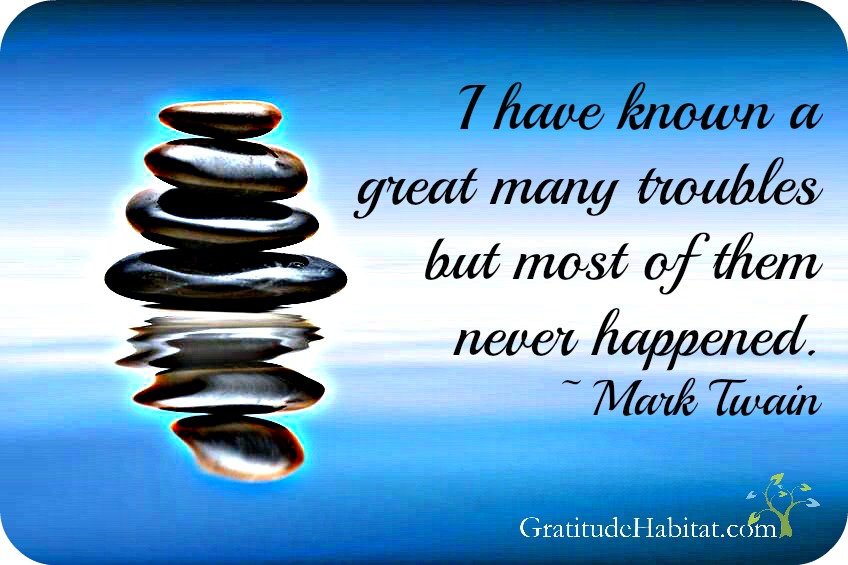Living In Gratitude: 6 Steps to Living in the Moment
We live in an age of constant distraction. Every day, we are bombarded with a myriad of interruptions, which have only gotten more frequent thanks to ever-evolving technology. We can be consumed by self-consciousness, anxiety and stress. These disturbances often have us fretting about the future or contemplating past mistakes. They take us away from living in the present moment.
We’re living in a world that contributes in a major way to mental fragmentation, disintegration, distraction, decoherence. ~ Buddhist scholar B. Alan Wallace
Our thoughts often control us, “coursing through our mind like a deafening waterfall”. Buddists refer to it as the Monkey Mind, because our consciousness vaults from thought to thought like a monkey swinging from one tree to another. This inhibits our ability to live in and enjoy the present.
Mindfulness is when we learn to quiet our monkey mind and live in the moment in a state of “active, open, intentional attention on the present.” Being mindful allows us to observe our thoughts without judgment. Rather than letting our thoughts control us, being mindful awakens us to experience life in the here and now.
The benefits of mindfulness
People who practice being mindful enjoy many benefits including:
- Being happier
- Enjoying higher self-esteem
- Higher level of empathy
- Exuberance
- Better relationships
- More accepting of their own weaknesses
- Less defensive
Learning to live in the moment involves a paradox. When we begin to expect mindfulness, we are focusing on the future. Instead, learning to use and trust in these 6 steps will help us quiet our chattering monkey minds and begin to lead us down a path of awareness of experiences.
6 Steps to Living in the Moment
-
Stop thinking about it
When we want to do our best we often over-think things, which actually hinders our performance rather than helping it. We turn inward, focusing on our anxiety and self-consciousness. By stepping outside of our own heads and engaging in the world around us, we minimize apprehension and worry and as a result, increase our performance.
Look around. Watch others. Get involved in conversations. Notice what’s happening without making judgments or taking things personally.
“Being present-minded takes away some of that self-evaluation and getting lost in your mind—and in the mind is where we make the evaluations that beat us up,” says Stephen Schueller, a psychologist at the University of Pennsylvania.
-
Learn to slow down and savor
In Elizabeth Gilbert’s memoir, “Eat, Pray, Love”, she discusses her friend who, whenever she arrives at a new destination, exclaims in a frenzy, “It is so beautiful here! I want to come back here someday.” “It takes all of my persuasive powers to try and convince her that she is already here,” states Gilbert.
Rather than trapping ourselves with thoughts of the past or the future, savor whatever it is we’re experiencing at the moment. Luxuriate in the here and now. Slow down and enjoy. Savor a meal. Immerse ourselves in a novel. Relish the sun’s warmth on our skin.
Studies found that when people took time daily to actively savor something they usually hurried through (a shower, their morning cup of coffee, a meal), they began experiencing more joy, happiness and other uplifting emotions. Focusing on and savoring the present abolishes our inclination to worry.
-
Focus on breathing
Like our heartbeat, our breath is always there with us. It offers a focal point for drawing us into the present moment, allowing us to orient ourselves in the “here and now”.
Focusing on our breath when we are feeling overwhelmed gives us a “time-out” of sorts. It can “inoculate against negative impulses,” fostering a grounded, serene state that encourages connections with others. When we are in this mindful state, we can better separate our ego from what’s happening around us, “rebooting our mind so we can respond thoughtfully to a situation”. This can have a powerful effect on our interpersonal life, strengthening our relationships with family, friends, coworkers and our significant other.
We can take time during any part of our day to focus on our breath. It can be done anywhere, at any time, for a few minutes or as long as necessary.
Steps to focusing on breath
- Sit or lie in a comfortable position. Your eyes can be open or closed.
- Turn your attention to your breath.
- Inhale slowly.
- Notice your lungs fill with air, your chest rise. Feel cool air enter your nose.
- As you exhale, notice similar sensations: your chest falling, warm air exiting your mouth or nose.
- When distracted by your surroundings or wandering thoughts, acknowledge these and gently bring your attention back to your breathing.
- Continue in this fashion until you feel yourself in a peaceful state of being present.
- Begin to expand your awareness from your breath to the space around you.
- When you are ready, open your eyes and bring the exercise to a close.
-
Lose track of time
The most complete way of living in the moment is becoming completely absorbed in whatever you’re doing. Reading a book, cooking a meal, taking a bike ride, walking the dog, engaging in a conversation, strolling through a museum. This state of absorption is referred to as flow. Flow is when we are so intensely engaged with what we are doing that we lose track of time. When flow occurs, our focus narrows, self-consciousness dissolves and our actions feel effortless.
Finding an activity that we enjoy and that challenges us can help access a state of flow. We all have activities that give us pleasure and fully engage us. It might be working in the garden, painting a picture, taking photographs, cooking a gourmet meal, going to the cinema. Make a point of engaging in things that promote flow.
-
If something is bothering you, move toward rather than away from it
Our inclination when confronted with something painful or irritating is avoidance. Our mind wants to resist unpleasant feelings, thought and sensations. But in life, there are many situations that we can’t avoid and by trying to repel them, we instead heighten the pain.
The solution is acceptance. By acknowledging our emotions, we open ourselves to the moment, accepting things that are beyond our control, such as grief. This doesn’t mean we have to like what is happening, that we forego goals or allow ourselves to wallow.
“Acceptance of the present moment has nothing to do with resignation,” states biomedical scientist Jon Kabat-Zinn. “Acceptance doesn’t tell you what to do. What happens next, what you choose to do; that has to come out of your understanding of this moment.”
Acceptance means ‘watching’ our thoughts, being aware that we are sad, angry or anxious and labeling those emotions. We are aware of thoughts, perceptions and feelings as they move through us without getting involved. Acknowledging without believing or falling victim to our thoughts is the power of acceptance.
-
Know that you don’t know
We’ve all had times when we are driving down a frequently traveled road, arriving at our destination without any recollection of the journey. These autopilot moments occur when we are so lost in thought that we disconnect from the present. We stop paying attention to what we are doing as well as our surroundings.
These attention “black outs” happen because of our familiarity with a situation. We’ve done the same thing multiple times and as such, we enter that autopilot haze.
To avoid these periods of zoning out and turning inward, we can develop a habit of noticing new things in every situation. By looking at things with a fresh, renewed perspective, we will realize that even our daily routines offer new experiences. New faces, new feelings and emotions, different weather, unique aromas. This mindful engagement in the moment allows us to recognize that our world is constantly evolving. These changes may be obvious or subtle. Make each day an adventure in noticing these transformations. The more we notice, the more we see.
Mindfulness is an intentional activity that we can do anytime by setting the intention to savor, engage, accept, breathe and observe the moment. What is happening this very instant? What do we see, feel, smell, taste? Recognize without judging.
Mindfulness is not a destination. It’s about living in the moment, experiencing now and becoming aware of being alive.








